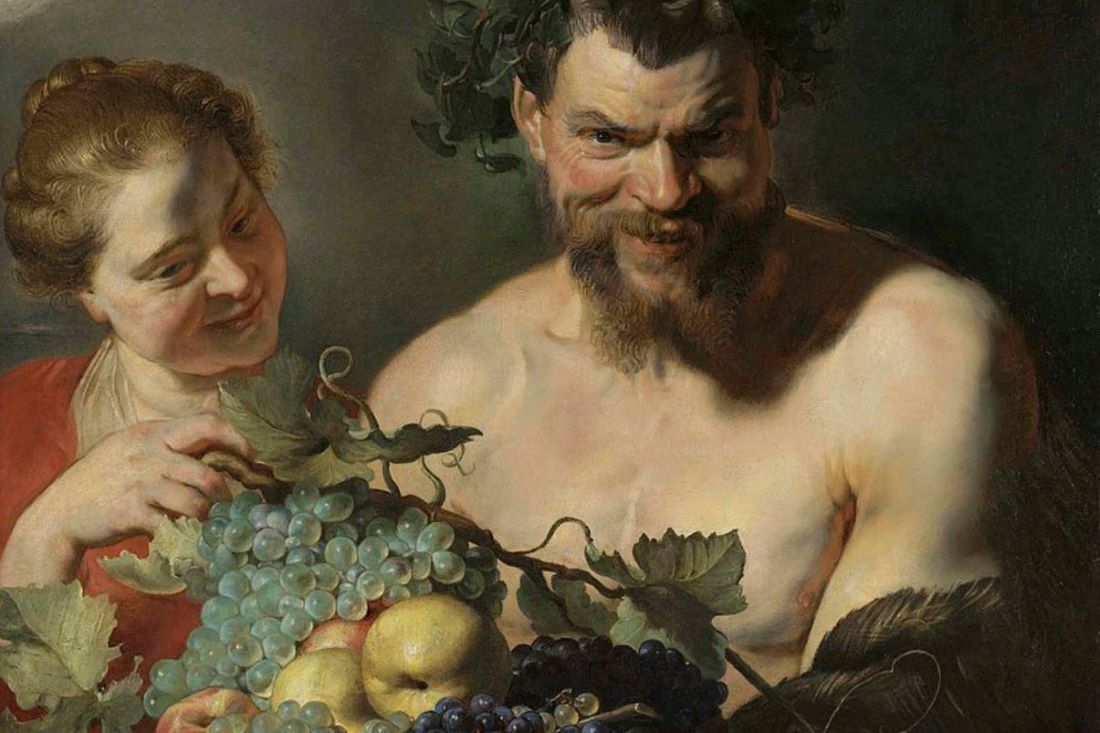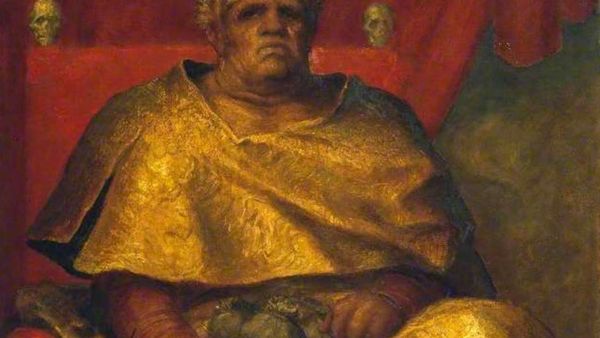Jan Rubens was in love, and then he was on the run. Once the affair with Anna of Saxony was discovered and Jan was arrested, he ran back to his wife, Peter Paul’s mother, begging her for forgiveness and for help. Who knows what was in the man’s heart? Maybe the whole ordeal created deep within the soul of Jan Rubens a love of his wife that had never existed before. Maybe the fog of love was lifted from his eyes, the fog of lust cleared away and gone too was the clouding monomania that sets in when a married man runs into the arms of another woman. Maybe one passion had overtaken the mind of Jan Rubens as he fell into this desperate affair with Anna of Saxony, an otherwise difficult woman as the contemporary sources say, and it made him forget about the rest of the world. He started to see everything through the lens of this clawing need, the need to be with Anna of Saxony, the need to manufacture more and more reasons that he spend time with her, work on projects with her, center his life around her. This became a demanding and unforgiving logic. He stopped asking why, he stopped considering his life in any other light than the light of need. He needed to be with Anna of Saxony, dearest Anna, the only woman alive.
When the affair finally got busted up, Jan Rubens emerged from the experience as if waking up from a dream. Suddenly, that passion didn’t seem real anymore. Suddenly, the insane drive to be with Anna of Saxony didn’t even make sense. What had he been thinking? At that moment, the whole experience with Anna of Saxony might have seemed to Jan Rubens like an insane aberration. He might have found it extremely difficult to understand himself, although it had undeniably been his own self, that very same person, him, who had fallen down, down into the obsession with Anna of Saxony, a woman who now seemed to him so terribly flawed, who seemed to be a selfish and demanding woman, who seemed never to have been worthy of all that effort in the first place. We can only imagine what it could have been like for Jan Rubens to go back to his own wife in shame and supplication.
We can only imagine what may have happened in the interior of Jan Rubens, to his thoughts and feelings when he received from his wife, Maria Rubens, a letter telling him that all was forgiven and that she would, in fact, stand by his side through all manner of worldly debacle. There is an astounding, you might even call it heroic, letter from Maria Rubens to Jan Rubens stating just such opinions. Or maybe it is a pathetic and weak letter, an embarrassing letter. It is hard to say. But the letter exists. It is part of the historical record. One part of me wants to call the letter heroic for the simple reason that it is so big of heart, so magnanimous, as they say. It is the kind of letter that only a person without the normal stores of anger and bitterness could write. That is what we can assume, at least.
In truth, it is impossible to know what motivated the letter. Maybe in some twisted and martyring way there is a form of revenge in the letter that Maria sent to Jan. Perhaps she gloried in her goodness. Maybe she lorded it over her husband, jabbing the fact of her own courage and fortitude into the soul of the man, a man who was deeply aware of his own cowardice, his own petty lusts. In fact, it is difficult to imagine that Maria Rubens was acting purely from the sense of a greater good, that her own capacity for big acts of spirit and generosity could have been of such astounding depth. So she will be a mystery to us, this Maria Rubens, as will so many women of that era, who have been erased except insofar as their lives touched upon the men in their lives, as will, in most ways, even Jan Rubens, and as will the specific thoughts of his son, Peter Paul Rubens, about his ruined father.
Jan Rubens. This is a man whose importance in history is as the father of a famous artist. We know the importance of this man. But it is an importance that isn’t his. He is important as a bearer of someone else. Can a man ever fulfill himself simply by being the father of greatness? Is that enough? It is easy to feel an admiration for Jan Rubens simply for the fact that he did it, he produced a great son, a son about whom the world would marvel. He is to be admired for having done this, though it is not clear exactly what it is that he did. It is unclear whether there is any relationship at all between the specific attributes of a father and the accomplishments of the son. A terrible father can produce a great son or daughter. A great father will produce terrible offspring just as often as not. There is no clear relationship there. No one knows why.
Still, there is a real accomplishment simply in being the father of the man who would later paint the portrait of Silenus. Even if it isn’t deserved. Even if the admiration cannot be linked to anything that Jan Rubens specifically did, the benefit comes anyway. In this, it has a similarity to the structure of grace. Grace doesn’t come for a reason. If it did, it could be “earned.” And earned grace wouldn’t be grace. If you want grace, if you are trying to get it, then you see it as a reward and it is not a reward. The paradox of grace is that it has to come for no reason at all. Grace must come, sometimes, oft times, for the debased and unworthy. If it did not, it would have no meaning. And yet, the very fact that it comes to the debased and the unworthy threatens to make it meaningless, inscrutable to the point of being unreal. This is the hard thought.
Probably grace is something that resists too much thought. Do we see it, though? Do we see it in the world, the way that an impossible grace does seem to touch the people of the world in unpredictable ways? Do we? We see for a moment just what is happening and why, even though we lose the thought just as immediately, even though we can’t bring it down enough to pick it apart and interrogate it. It escapes. Grace comes and then it escapes, before we were ever able to know it.
Maybe Jan Rubens is the recipient of a form of historical grace. Subsequent events in the life of his son give something backwards in history to Jan Rubens and transform him. He does nothing. He is dead when it all happens. Jan Rubens died in 1587. That is the end of the story for him. But it is not the end of the story. Peter Paul Rubens was born in 1577, so he was ten years old when his father died. Whatever the vague hopes in the mind of Jan Rubens, he died knowing nothing. He died a broken man, probably. He had denied his earlier Anabaptist leanings. He had fled Antwerp in the storms of the religious wars. He had struck up an insane affair with that woman, Anna of Saxony, all in the glow, we must imagine, of life and its possibilities. And then he was struck down. He was met with the ultimate test. Will you die for these things? Will you die for Anna of Saxony and the picture of life and its possibilities that you held in your heart? And he relented immediately. I recant, he said. I relent. I want to live. I want to be taken back into the life I had before. He broke. Jan Rubens broke and relinquished everything. He became then, we have to imagine, a thoroughly and completely broken man when he was released from prison and began to live with his family in Siegen where it was relatively safe, where he could hide from the ongoing storms of history that had been too much for him.
And then, flying in the face of everything he had actually done, anything he had actually deserved, Jan Rubens began to collect the un-hoped-for dispensations of grace. I suppose the first act of grace was a personal one. It was in the matter of personal relations, the way that individuals can suddenly rise up and become larger. Maria Rubens is just such a person, no matter how often we can suspect her, even doubt her. Did she have a devilish way of seeing ten moves ahead in the game of life and somehow calculating her way to an act of grace? Then it wouldn’t be grace anymore, of course. Then we could take it away from her, we could snatch her grace back and call her the greatest devil of them all. She would be guilty of taking her husband’s shame as a vehicle for her own greatness. She would be terrible, the most calculating woman imaginable.
Or maybe she was just weak. She wanted her man back and she was willing to grovel at the feet of princes and potentates and to forgive all the selfishness and pettiness of her own husband because she didn’t have strength enough just to walk away. She was a woman, perhaps, trapped in her historical circumstances. She was a woman silenced and trapped and her only route forward was to try to rebuild, pitifully, the marital life that had existed for her before everything fell apart. What else could she do as a woman of the sixteenth century? And so her letter is just another sad document of what it means to be a woman in an era when being a woman was a kind of prison and cage. But we cannot take it away from Maria Rubens, we can’t take that letter away from her completely. The part that wants to distrust her in her moment of grace is overwhelmed by the fact of the thing. She did write that letter and, more importantly, she followed through on what it meant. That letter meant a life of pain and sacrifice for Maria Rubens. And that’s the way it was. She wrote that letter and crawled back into the hole of suffering wifedom. In 1587 her husband Jan Rubens died, a forgotten man marked, at that point in time, by the disgrace of his entirely disastrous affair with Anna of Saxony, a disgrace (dis-grace) that led to his long imprisonment and to his renunciation of all the things he’d ever claimed to care about. So the letter is an act of supreme self-sacrifice.
But the letter is also an act of great defiance. She did it. She defied history. She defied the execution ordered by William the Silent. She defied the selfishness of her husband. There is a stubborn and immense power that can still touch one, through all the centuries, in that letter from Maria Rubens. She is still alive in that letter, while her husband, the cowardly Jan Rubens, is so very dead to us now. She, Maria Rubens, is the very vehicle Jan Rubens experiences passion as love and love as death of grace, while he, Jan Rubens, is simply the undeserving recipient.
And then came the second act of grace, which was bestowed by the force of history in a backward-moving motion. Jan Rubens’s son, Peter Paul Rubens, began to paint. And in painting Peter Paul found something. Peter Paul Rubens had a greatness in him. He painted, for instance, the Silenus painting. And from that painting it is almost as if the vapors from the oils and the chemicals themselves drift back into history and do the work of grace. Something goes back to the father and raises him up and redeems him. Suddenly, and in death, the father becomes a participant in that greatness although he has done nothing at all, although nothing has changed, although the facts of his life and his disgrace and his cowardly abandonment of everything he once stood for have not changed. Nothing has changed. But Jan Rubens has been changed. An act of historical grace has occurred.
EDITORIAL NOTE: This excerpt is adapted from chapter 11, "Jan Rubens experiences passion as love and love as death, which can make us wonder whether love is always in some core way connected to death. And beyond that, love and death are sometimes overseen by a strange power we might call historical grace," in The Drunken Silenus: On Gods, Goats, and the Cracks in Reality (Eugene, Oregon: Slant Books, 2020). Reprinted in collaboration with Slant Books, an imprint of Wipf & Stock, all rights reserved.


